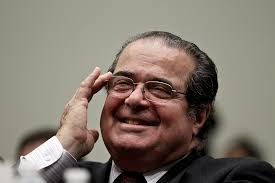
The death of Justice Antonin Scalia is a blow to businesses that have had success recently in challenging class action cases at the U.S. Supreme Court was evidenced when Dow Chemical Co's agreement to pay $835 million to settle a price-fixing dispute.
Rather than risk its fate being decided by a shorthanded, Dow which is in the process of merging with Dupont settled the decade-long dispute.
The Dow dispute had been on hold at the high court pending the outcome of another case. Dow was accused of conspiring to artificially inflate polyurethane prices.
The court's conservative wing lacks the five votes needed "to make dramatic new rules that curtail class actions," following Scalia's February 13 death, executive director of consumer advocacy group Public Justice.
There was an "increased likelihood for unfavorable outcomes for business involved in class action suits" after Scalia's death and the raging political fight over naming his successor, Dow said in a statement.
During Supreme Court’s current term with Scalia on the bench, two important class action cases were argued before it. It appeared Tyson Foods Inc would lose its challenge to an almost $5.8 million class action judgment, with or without Scalia's vote, based on November's oral argument.
Pending its decision in the Tyson Foods case, decision on whether to hear Dow's case was put off by the court.
Awaiting the Tyson ruling, a Wal-Mart Stores Inc challenge to another class action lawsuit also was on hold before the high court. A $187 million class action judgment over its treatment of workers in Pennsylvania is being sought to be eliminated by Wal-Mart.
There have not been any settlement talks prompted by Scalia's death, Michael Donovan, a lawyer for the plaintiffs, said.
Online search company Spokeo Inc is at the centre of the other class action case heard by the Supreme Court this term. There was possibility that the court could be split 4-4 as the court appeared closely divided following November's oral argument. Although such a ruling would not set a national precedent, that would hand a victory to the plaintiffs.
The court in recent years had issued a series of rulings curbing class-action litigation against businesses with Scalia joining the four other conservative justices in the majority. These included significant victories for Wal-Mart in 2011 and Comcast Corp in 2013.
Scalia wrote the majority opinion for the court in those two cases. The Comcast ruling was 5-4. The Wal-Mart decision was 5-4 on one aspect and unanimous on another.
The court's decisions on which new cases to hear can be influenced by Scalia's absence. Four of the eight remaining justices must agree in order for the court to take up a case.
The high court could remain shorthanded for more than a year as resident Barack Obama poised to nominate a successor but the Republican-controlled Senate insisting that the next president, due to take office in January 2017, fill the vacancy.
There is anticipation that any nominee picked by Obama or another Democratic president could be expected to be more sympathetic to plaintiffs bringing class action cases against businesses.
(Source:www.reuters.com)
Rather than risk its fate being decided by a shorthanded, Dow which is in the process of merging with Dupont settled the decade-long dispute.
The Dow dispute had been on hold at the high court pending the outcome of another case. Dow was accused of conspiring to artificially inflate polyurethane prices.
The court's conservative wing lacks the five votes needed "to make dramatic new rules that curtail class actions," following Scalia's February 13 death, executive director of consumer advocacy group Public Justice.
There was an "increased likelihood for unfavorable outcomes for business involved in class action suits" after Scalia's death and the raging political fight over naming his successor, Dow said in a statement.
During Supreme Court’s current term with Scalia on the bench, two important class action cases were argued before it. It appeared Tyson Foods Inc would lose its challenge to an almost $5.8 million class action judgment, with or without Scalia's vote, based on November's oral argument.
Pending its decision in the Tyson Foods case, decision on whether to hear Dow's case was put off by the court.
Awaiting the Tyson ruling, a Wal-Mart Stores Inc challenge to another class action lawsuit also was on hold before the high court. A $187 million class action judgment over its treatment of workers in Pennsylvania is being sought to be eliminated by Wal-Mart.
There have not been any settlement talks prompted by Scalia's death, Michael Donovan, a lawyer for the plaintiffs, said.
Online search company Spokeo Inc is at the centre of the other class action case heard by the Supreme Court this term. There was possibility that the court could be split 4-4 as the court appeared closely divided following November's oral argument. Although such a ruling would not set a national precedent, that would hand a victory to the plaintiffs.
The court in recent years had issued a series of rulings curbing class-action litigation against businesses with Scalia joining the four other conservative justices in the majority. These included significant victories for Wal-Mart in 2011 and Comcast Corp in 2013.
Scalia wrote the majority opinion for the court in those two cases. The Comcast ruling was 5-4. The Wal-Mart decision was 5-4 on one aspect and unanimous on another.
The court's decisions on which new cases to hear can be influenced by Scalia's absence. Four of the eight remaining justices must agree in order for the court to take up a case.
The high court could remain shorthanded for more than a year as resident Barack Obama poised to nominate a successor but the Republican-controlled Senate insisting that the next president, due to take office in January 2017, fill the vacancy.
There is anticipation that any nominee picked by Obama or another Democratic president could be expected to be more sympathetic to plaintiffs bringing class action cases against businesses.
(Source:www.reuters.com)





